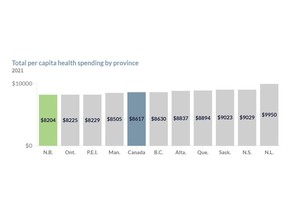More N.B. spending needed to fix health system: Vitalité
'We don't want money just to spend money. We want to make sure we're doing the right things. We want to make sure New Brunswickers are safe.'

Article content
New Brunswick’s low per-capita spending on health care has been a “sore spot for a long time” and makes it difficult to make long-term improvements while providing everything patients need, according to the vice-chair of Vitalité Health Network’s board of directors.
In an ideal world, Réjean Després recently told Brunswick News, provincial health spending would be mapped out over multiple years so the required improvements to the system can be made.
That’s not going to happen, says Health Minister Bruce Fitch.
According to data from the Canadian Institute of Health Information (CIHI), in 2021, the provincial government spent $8,204 per person on health care – the lowest in the country.
According to CIHI’s 2023 forecast, that number likely rose to $8,413 per person, slightly higher than Ontario ($8,245), which was projected to spend the least in Canada. The national average per-person spend in 2023 was projected to be $8,740.
For several years, the Progressive Conservatives have touted their “record” provincial health spending, and indeed, it has hit new highs each year. But that’s far from unusual. Every province is spending record amounts on health every year.
Després is part of Vitalité’s appointed board of directors, which was formed last year. In mid-2022, Premier Blaine Higgs fired the elected boards of the Vitalité and Horizon boards after a patient died in the emergency room waiting area of Fredericton’s hospital.
Since Després and the other board members joined Vitalité, one of the biggest challenges has been to stay within the budget allotted by government – something it hasn’t done because of the ongoing “extraordinary” cost of the travel nurse contracts.
“Yes, there are some funding gaps in New Brunswick,” Després said, citing CIHI’s numbers.
“We’ve always found ways to be effective with the source of funding that we’re receiving. And if you add the complexity that we also have an older population, I think serving that population actually makes it more expensive.
“So we have an average population that’s older than the Canadian average, and within New Brunswick, the French population is older than the English population on average.”
Throw the challenges of managing COVID-19 into that mix, and it all adds up to an “added burden” for Vitalité, Després said.
“We don’t want money just to spend money. We want to make sure we’re doing the right things. We want to make sure New Brunswickers are safe. So yes, funding has been a sore spot for a long time.”
Premier Blaine Higgs, however, has consistently rejected the idea that throwing more money at the health system will fix it. And he’s also repeatedly noted his government’s record spending.
“Since we’ve been in office the expense budget is up 26 per cent from where we started. The three biggest departments have all grown substantially with health up 27 per cent, education up 29 per cent, and social development up 35 per cent,” Higgs said during the annual State of the Province address.
“Our government is spending at record levels.”
Whether it’s enough is an ongoing debate.
While recently asking questions about the projected $3.8-billion in health spending for the 2024-2025 fiscal year, Green MLA Megan Mitton said she understood that Vitalité had asked for $56 million to expand collaborative practices in primary health care – a number later confirmed by Vitalité.
Providing that money, said Patrick Parent, the network’s assistant chief executive officer, would have allowed Vitalité to “fully deploy its local collaborative family care teams which to date have reduced wait times in less than six months.”
The health network will get less than half of that cash. However Fitch did leave the door open for incremental funding boosts during the year.
Asked to weigh in on Després’ comments about the possibility of multi-year heath funding done at once, Fitch said while the health budget is set on a year-to-year basis, there’s “reasonable stability” in the numbers.
“That’s the method that we have to work with, but I think there are those long-term plans that can give some amount of stability in looking forward.”












Postmedia is committed to maintaining a lively but civil forum for discussion. Please keep comments relevant and respectful. Comments may take up to an hour to appear on the site. You will receive an email if there is a reply to your comment, an update to a thread you follow or if a user you follow comments. Visit our Community Guidelines for more information.